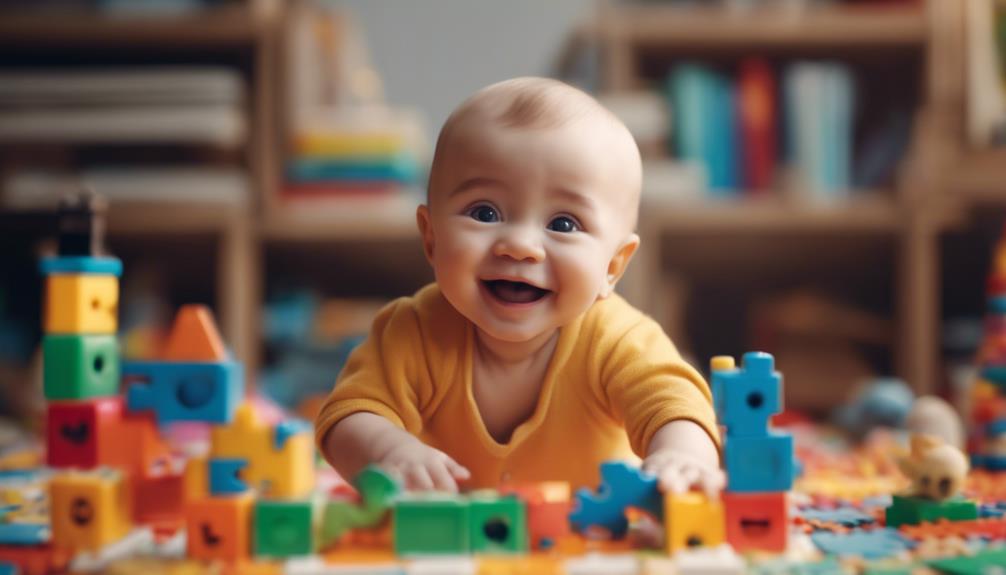If you notice your baby shows signs like limited eye contact, doesn’t respond to their name, or avoids certain textures, these could be early indicators of autism. Sensory sensitivities, such as reacting strongly to loud sounds or bright lights, along with repetitive behaviors like spinning toys, are also common signs. Delays in speech or social engagement might stand out too. Recognizing these early clues can help you seek support sooner—continue exploring to learn more about these important signs.
Key Takeaways
- Limited or absent eye contact and social responsiveness may indicate early signs of autism.
- Repetitive behaviors or intense focus on specific objects can be early behavioral indicators.
- Sensory sensitivities, such as overreacting to loud sounds or textures, are common early signs.
- Delayed speech development and reduced responsiveness to names suggest communication challenges.
- Early detection of developmental differences allows for timely intervention and support.

Recognizing early signs of autism in babies can be challenging, but being aware of certain behaviors can help you seek guidance sooner. One of the key indicators involves sensory sensitivities. You might notice your baby reacting unusually to stimuli—covering their ears when hearing loud noises, turning away from bright lights, or seeming overwhelmed by certain textures. These responses often point to heightened sensory sensitivities, which are common in infants who later receive an autism diagnosis. If your baby seems consistently bothered by sensory input or avoids certain sensations altogether, it’s worth discussing with a healthcare professional. Early intervention can make a significant difference in helping your child navigate sensory challenges.
Early signs include sensory sensitivities like overreacting to loud noises or bright lights.
Another important aspect to observe is social engagement. Babies typically start to show interest in interacting with others by making eye contact, smiling, or responding to your voice. If your baby rarely makes eye contact, seems uninterested in social interactions, or doesn’t respond to their name, these could be early signs of autism. You might notice that your baby prefers to play alone, avoids cuddling, or doesn’t seem to seek comfort from familiar people. These behaviors aren’t definitive on their own, but combined with other signs, they can signal developmental differences that merit professional evaluation. Early recognition of social engagement issues allows you to seek support that can promote social and emotional growth.
It’s also common for parents to observe repetitive behaviors or intense focus on specific objects. For example, your baby might fixate on spinning objects or seem unusually obsessed with certain toys. These behaviors often serve as comfort or ways to self-regulate, but they can also be early indicators of autism spectrum disorder. Similarly, you might notice a lack of typical babbling or delayed speech development, which can further suggest that your baby’s social and communication skills are developing atypically. Additionally, research shows that early signs of autism are often linked to increased sensory sensitivities and behavioral patterns, emphasizing the importance of early detection.
While every baby develops at their own pace, being attentive to these early signs helps you differentiate between typical variations and potential concerns. If you notice sensory sensitivities, limited social engagement, or repetitive behaviors, don’t hesitate to consult your pediatrician. Early screening and intervention can provide your child with the support they need to thrive, making a meaningful difference in their long-term development. Trust your instincts—being proactive is the best step toward ensuring your baby’s well-being.
Frequently Asked Questions
When Should I First Consult a Specialist About My Baby’s Development?
You should consult a specialist as soon as you notice your baby’s development milestones aren’t being met or if parental concerns arise. Early intervention is vital, so trust your instincts and seek advice promptly. If your baby isn’t responding to sound, eye contact, or showing typical social behaviors, don’t wait. Addressing concerns early helps guarantee your baby gets the support they need to thrive.
Are There Specific Behaviors That Are More Concerning Than Others?
While some behavior patterns may seem typical, certain social cues and behaviors stand out. If your baby avoids eye contact, isn’t responsive to their name, or shows limited gestures like pointing or waving, these are more concerning signs. These behaviors are less common and may indicate developmental differences. Trust your instincts—early attention to these specific behaviors can make a significant difference in addressing any underlying issues.
How Do Early Signs Differ Between Boys and Girls?
You might notice gender differences in early signs, with boys often showing more obvious behavioral variations like less eye contact or delayed speech. Girls may display subtler signs, such as quieter play or less responsiveness, making early detection trickier. Understanding these differences can help you stay attentive to diverse behaviors, ensuring you don’t overlook potential early indicators based on gender, and seek guidance promptly if concerns arise.
Can Early Intervention Improve Long-Term Outcomes?
Early intervention can markedly improve long-term outcomes for your child. When you pursue an early diagnosis, you enable access to targeted support and therapies that address specific needs. The intervention benefits are clear: better communication, social skills, and reduced challenges as your child grows. Acting early gives your child the best chance to develop essential skills, leading to a more independent and fulfilling life.
What Are Common Misconceptions About Autism in Babies?
You might believe autism myths, but it’s essential to recognize common stereotypes that can mislead you. Not all babies with autism show signs early, and behaviors vary widely. Some think autism means they’re less affectionate or less intelligent, but that’s false. Understanding the truth helps you support your child better. Avoid assumptions based on autism myths, and seek accurate info to ensure your child gets the help they need.
Conclusion
Paying close attention to early signs of autism in your baby is like catching a fragile butterfly before it slips away. Trust your instincts and seek guidance if something feels off. Early intervention can be the key to revealing your child’s full potential, turning uncertainty into hope. Remember, you’re the lighthouse guiding your little one through uncharted waters—your awareness can light the way to a brighter future.










